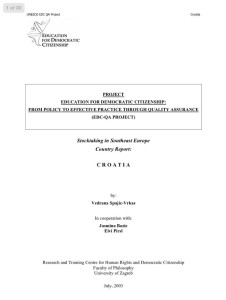EDC-QA: Country Report: Croatia (Spajić-Vrkaš, Božić, Piršl)
Sažetak
Projekt Osiguranje kvalitete u obrazovanju za demokratsko građanstvo u Hrvatskoj je proveo Istraživačko-obrazovni centar za ljudska prava i demokratsko građanstvo Filozofskog fakulteta Sveučilišta u Zagrebu, od svibnja do srpnja 2003. g. Cilj je bio sakupiti podatke o politici, zakonodavstvu, teoriji i praksi ključnih aspekata sustava osiguranja kvalitete u obrazovanju za demokratsko građanstvo u kontekstu reforme obrazovanja. Zadaća je obavljena putem intervjua i fokus grupa u kojima su sudjelovali predstavnici Ministarstva prosvjete i športa te lokalnih vlasti, nacionalnih savjetodavnih i istraživačkih institucija, fakulteta i učiteljskih akademija, profesionalnih organizacija učitelja i sindikata, potom ravnatelji i učitelji u osnovnim i srednjim školama, te predstavnici relevantnih nevladinih udruga. Njihove odgovore autorice su kombinirale s rezultatima analize pravnih, strategijskih i drugih bitnih tekstova.
Izvješće analizira pojavu sustava osiguranja kvalitete u obrazovanju općenito te osobito u obrazovanju za demokratsko građanstvo, kako ga shvaća i primjenjuje široki niz sudionika obrazovnog procesa. Odnedavno su poduzeti bitni koraci naprijed, bilo kao inicijative pojedinih škola i učitelja, bilo kao institutionalne inicijative. Postoje škole koje razvijaju participativne stilove upravljanja, uključuju sve učitelje, učenike i roditelje u razradu školskih razvojnih planova, te koriste mogućnosti koje otvara Nacionalni program obrazovanja za ljudska prava. Međutim, općenito govoreći, još uvijek prevladava pristup kontrole kvalitete, nasuprot pristupu osiguranja kvalitete, a kvaliteta obrazovanja i dalje se često shvaća kao puko adekvatno primjenjivanje okvirnog nacionalnog plana i programa, iako indikatori kvalitete nisu razvijeni.
Izvješće otkriva da u razumijevanju reforme obrazovanja u Hrvatskoj i dalje prevladava pristup odogzo prema dolje, dok se osnaženje škola, kojim bi se škole učinile su-kreatorima i partnerima središnjih institucija u osiguranju kvalitetnog obrazovanja, u mnogome zanemaruje.
Summary
The project on Quality Assurance in Education for Democratic Citizenship was carried out in Croatia by the Research and Training Centre for Human Rights and Democratic Citizenship of the Faculty of Philosophy University of Zagreb from May to July 2003. Its aim was to collect data on policy, legislative, theory and practice of key aspects of quality assurance system in education for democratic citizenship in the context of education reform. The task was performed through interviews and focus-group discussions with the representatives of the Ministry of Education and Sport (MoES) and local governments, national advisory and research institutions, faculties and teachers’ colleges, teacher professional organisations and trade unions, elementary and secondary school principals and teachers, and relevant NGOs. A total of 70 persons from Zagreb, Slavonia and Istria were contacted, 48 of whom accepted to take part in research. Over three fourth of respondents were interviewed in situ individually, in pairs or in a focus-group of four or five, while one fourth responded in written form by fax or email. The duration of in situ individual interviews was between 2 and 3 hours and of the focus-groups approximately 5 hours. The data thus collected make an exquisite 570-page account on how education reform and the introduction of education for democratic citizenship, in general, and the emergence of quality assurance system, in particular, are understood and practiced by a wide range of stockholders in the field. Their answers were in the present report combined with the results of analysis of legal, policy/strategic and other relevant texts so as to ensure better understanding of a dynamic nature of relations between the priorities (should) and realities (is) of contemporary education changes in Croatia.
The report analyses the emergence of quality assurance system in education in general and in education for democratic citizenship in particular, as understood and practiced by a wide range of stake-holders in the field. Recently, important steps forward have been taken, some through individual schools/teachers’ initiatives, others through institutional forms. There are examples of schools developing participative styles of governance, involving all teachers, students and parents in elaborating school development plans, and using opportunities opened by the National Human Rights Education Programme. However, in general the quality control approach still predominates, and education quality is often understood simply as adequate implementation of the national framework plan and programme, though quality indicators are largely missing.
The report reveals that current understanding of educational reform in the country is still heavily immersed in top-down approach, while neglecting school empowerment that would make schools co-creators and partners to central institutions in securing quality education.
Downoad pdf.:EDC-QA Croatia-Report

